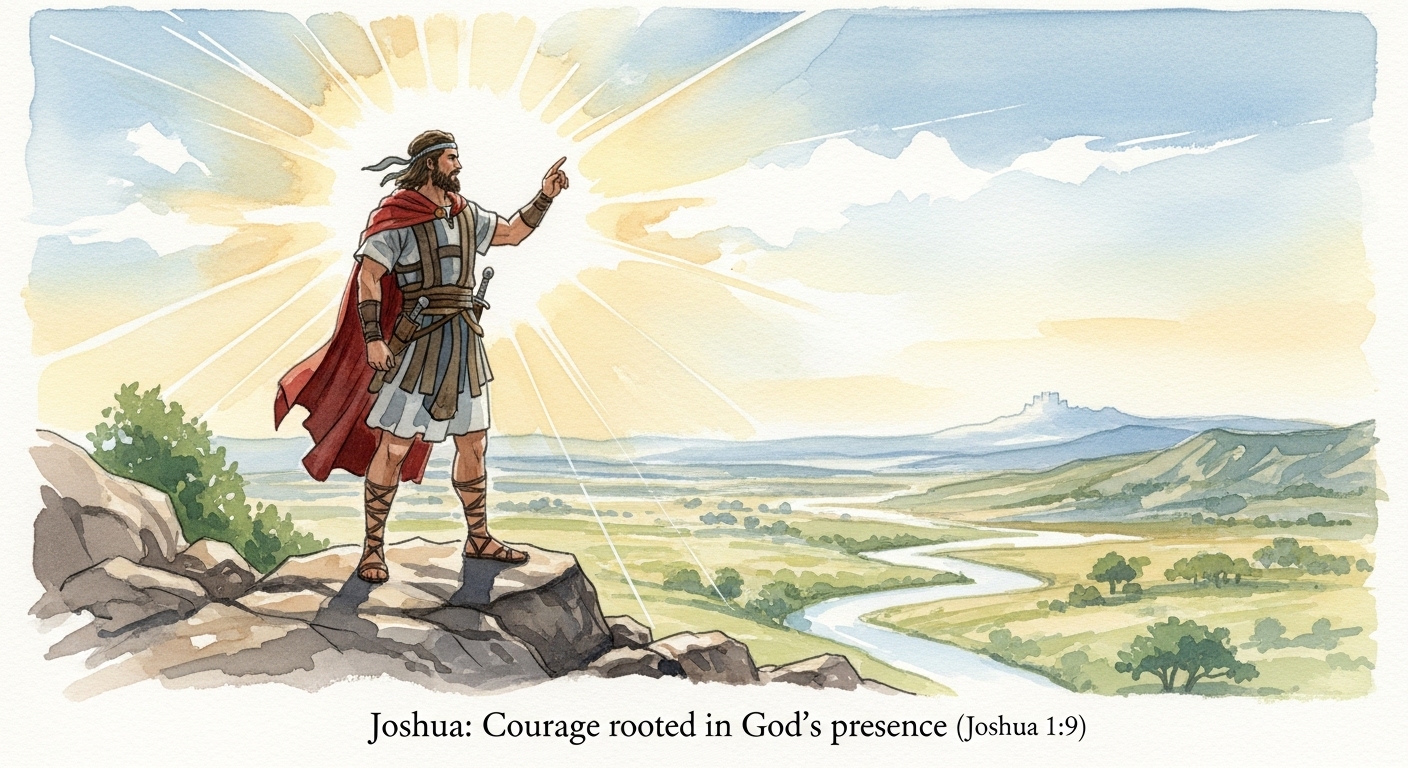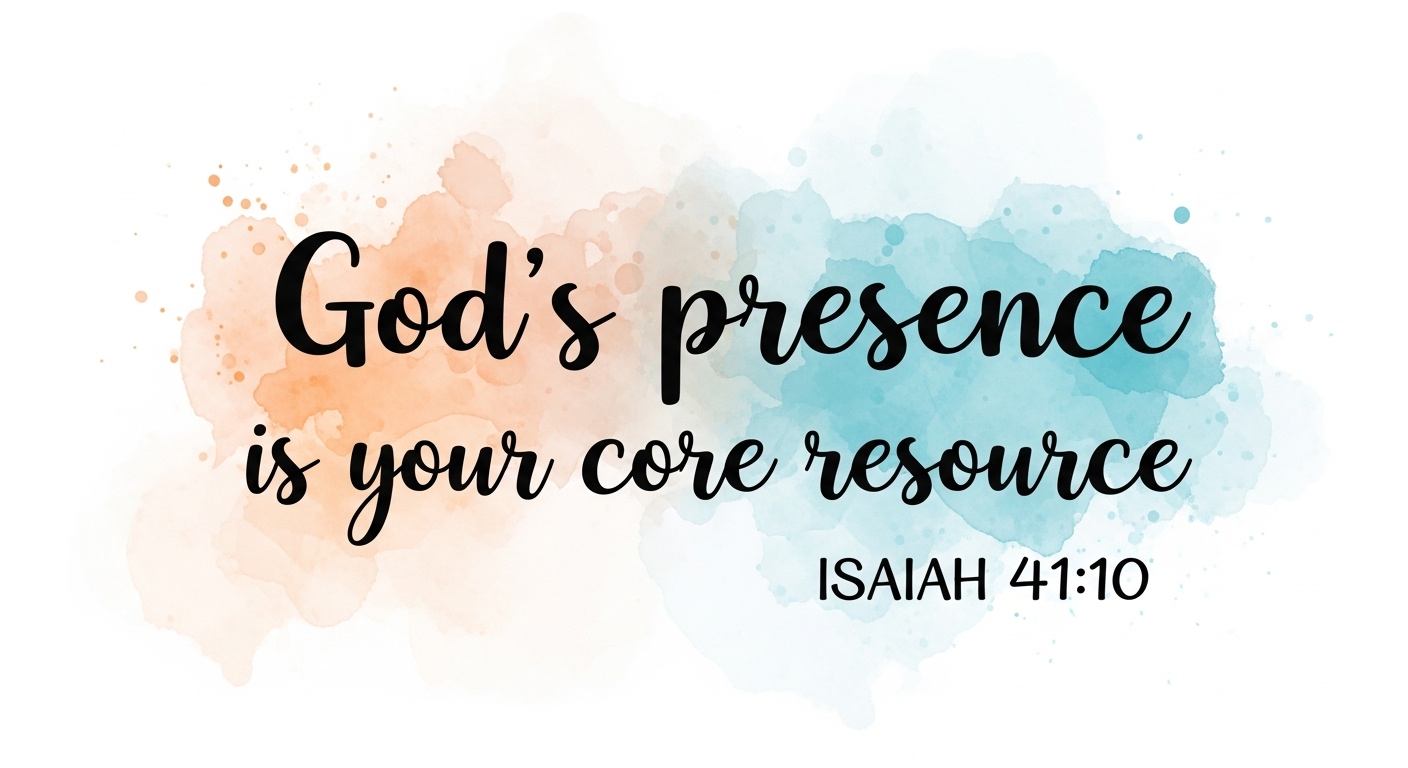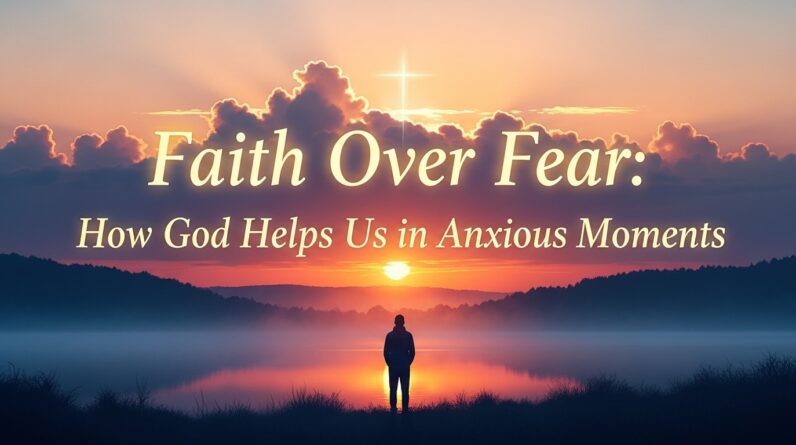Fear Not: God Is With You In Every Battle
You’re going to read this and feel the nudge to breathe easier. When a storm rolls in — whether it’s a health scare, a job loss, a broken relationship, or the whisper of doubt in your mind — the Bible’s command to “fear not” isn’t a cold, distant slogan. It’s a promise: God is with you in every battle. In the pages that follow, you’ll see how Scripture uses both command and comfort to move you from trembling to trusting, from strategy to surrender, and from isolation to companionship. You’ll meet Joshua, David, and Mary — not as untouchable heroes, but as people who learned to face fear because God was present with them. Read these words and let them settle into your chest: fear not — you are not alone.
What “fear not” really means for you
“Fear not” is more than an instruction; it’s an invitation to trade panic for presence. When you hear “fear not,” the Bible is calling you to reorient your heart. It doesn’t promise that trouble will vanish, but it does promise that you won’t be abandoned in the middle of it. The phrase invites you to move from frantic self-reliance into trusting companionship with God, who is active in your battles. This promise is practical as well as spiritual: it changes how you pray, how you decide, and how you stand when the ground shakes beneath you.
The biblical foundation for “fear not”
The Scriptures are filled with God’s command to be strong, courageous, and unafraid. These commands are anchored in the reality of God’s presence and power. For instance, God tells Joshua to be strong and courageous and not to be terrified because He will be with him: Joshua 1:9. Similarly, God assures His people in Isaiah with the words “Do not fear, for I am with you”: Isaiah 41:10. When you see “fear not” in Scripture, you’re encountering a promise tied to God’s nearness, not a demand for stoic bravery without help.
Why does God command you to “fear not”
God commands you to “fear not” because fear hinders faith and obedience. Fear tends to shrink your vision, scramble your judgment, and push you into survival mode that ignores God’s voice. By commanding “fear not,” God is steering your heart back into relationship and action. The command is always paired with a reason or assurance — because He goes with you. He strengthens you because He upholds you. These assurances reframe your fear into a context of divine partnership. When you remember that, fear loses much of its intensity.

Joshua: Courage rooted in God’s presence
When you read the story of Joshua, you see leadership tested by enormous unknowns. God commissions Joshua to lead Israel into the Promised Land and repeatedly commands him to be strong and courageous. The reason? God promises His presence: “Have I not commanded you? Be strong and courageous. Do not be terrified; do not be discouraged, for the LORD your God will be with you wherever you go.” See it for yourself: Joshua 1:9. Joshua’s courage wasn’t a self-generated trait; it was a response to God’s ongoing presence. When you face your own “Promised Land” moments — new jobs, risky decisions, or spiritual callings — you can take the same root: courage that stands because God stands with you.
The fall of Jericho: God fights for you
One of the clearest pictures of God fighting on behalf of His people is the fall of Jericho. Joshua received explicit instruction from God about how the city would be taken — an unconventional, obedience-testing plan that required trust: Joshua 6:2-5. You may not march around a city for seven days, but you will face battles that demand obedience without immediate evidence. The lesson you learn with Joshua is that when God gives instruction, even when it seems odd, obedience often opens the door for God to move. That’s a tangible way the command to “fear not” turns into a daily posture of obedient trust.
David: Courage from conviction, not circumstance
David’s life is often romanticized as a series of successes, but you need to remember his fear-filled contexts: hunted by Saul, responsible for a nation, tempted to sin, grieving losses. His confrontation with Goliath is where “fear not” comes alive in action: David refuses to be intimidated by the giant or the army watching him; instead, he declares his confidence in the Lord: “You come against me with sword and spear and javelin, but I come against you in the name of the LORD Almighty…” Read his bold declaration here: 1 Samuel 17:45-47. David’s courage was not naive; it was based on a conviction that God was on his side. When you stand before your giants — whether they’re addiction, debt, or fear of failure — you can follow David’s example: face them with the conviction that God is your defender.
Psalm 23 and walking through the valley
David penned words that have comforted generations: “Even though I walk through the valley of the shadow of death, I will fear no evil, for you are with me…” Psalm 23:4. That image of a shepherd walking with you through your darkest places is not sentimental — it’s a profound assurance that in your most threatening moments, God does not abandon you. You can read these words not as an escape from pain, but as a guarantee that pain will meet presence. When you’re in the valley, you can still say “fear not” because God walks there beside you.
Mary: Fear quelled by grace and purpose
Mary’s story brings a feminine and deeply human angle to the command to “fear not.” When the angel Gabriel announced to Mary that she would bear the Messiah, his opening words were, “Do not be afraid, Mary; you have found favor with God.” See the greeting here: Luke 1:30. Mary was a young woman facing scandal, uncertainty, and danger. Yet she responded with faith: “I am the Lord’s servant. May your word to me be fulfilled.” Her courage came from submission to God’s purpose and from the reality of God’s favor. When your calling seems risky or your future foggy, you can say “fear not” in the same way: lean into God’s purpose and favor even when the path is unclear.
The interplay of fear and faith in Mary’s story
Mary’s fear didn’t vanish instantly; the human realities of shame, risk, and misunderstanding were real. But her story shows you how fear can be held and transformed within faith. Gabriel’s message didn’t minimize the gravity of what Mary faced; it reframed it. You can do the same: acknowledge your fear, then let God’s promises and purposes reshape it. When you choose faith over flight, you echo Mary’s “yes” and activate the promise to “fear not.”

God’s presence is your core resource
Every instance of “fear not” in Scripture is anchored to God’s presence. The reassurance is not “you can do this,” but “I will be with you while you do this.” Consider Isaiah’s promise: “Do not fear, for I am with you; do not be dismayed, for I am your God…” Isaiah 41:10. Or Jesus’ final words to His disciples: “And surely I am with you always, to the very end of the age.” Matthew 28:20. When you internalize God’s presence, fear loses its dominion because the ultimate reality becomes God’s nearness, not your insecurity.
Practical ways to experience God’s presence when fear rises
It’s one thing to know that God is with you. It’s another to feel it in the middle of a panic attack, a late-night worry, or a crisis. You need practical habits that help you move from head knowledge to heart experience.
- Turn to Scripture: Anchor your thoughts in God’s promises, like “fear not,” by reading verses that remind you of God’s presence. Philippians instructs you to present your requests to God and promises His peace: Philippians 4:6-7.
- Pray deliberately: Speak your fears aloud and bring them to God. Prayer is not proof that you don’t feel fear; it’s the pathway through which God meets you in it. Jesus offered peace to His disciples: John 14:27.
- Remember God’s past faithfulness: When you recount how God has helped before, you make faith tangible for the present. The psalmists frequently rehearse God’s deeds to ward off fear.
- Worship and community: Singing truth and being with others who speak God’s promises over you helps you feel less alone and more grounded.
How your identity in Christ disarms fear
Your identity matters. Fear whispers, “You are alone,” or “You are powerless,” but Scripture counters: you are a child of God; you are loved; you are empowered. Paul reminds you that God did not give you a spirit of fear, but of power, love, and self-discipline: 2 Timothy 1:7. When you internalize that identity, fear begins to lose its grip because the truth of who you are (a beloved, empowered child of God) outshines the lie fear tells.
Common fears and the Scriptures that meet them
Your fears may come in different forms — fear of failure, fear of the future, fear of rejection, fear of death — and each has biblical antidotes.
- Fear of the future: God promises to be with you. Isaiah’s “do not fear” assures you of His presence: Isaiah 41:10.
- Fear of rejection and loneliness: Jesus promises His perpetual presence: Matthew 28:20.
- Fear of death: David’s confidence in God’s shepherding presence addresses this: Psalm 23:4.
- Fear in the face of power: Remember David’s confrontation with Goliath and God’s defense: 1 Samuel 17:45-47.
Don’t treat these verses like magic spells to utter and then forget. Use them as anchors to remind your heart of truth when fear rises.
Spiritual practices to strengthen you in battle
Battles aren’t won by one-off prayers; they’re won by sustained spiritual habits that shape your soul.
- Daily Scripture reading: Let God’s promises fill your mind. Repetition rewires fear responses.
- Prayer rhythms: Short, frequent conversations with God help you rehearse trust.
- Confession and repentance: Fear often grows in the dark places of unaddressed sin and unresolved guilt. Bring those to light.
- Fasting and focused intercession: These practices sharpen your dependence on God and reduce the pull of worldly comforts.
- Fellowship: Surround yourself with people who can speak truth into your fears and will stand with you.
Each of these practices helps you embody the command “fear not” by creating a lifestyle tethered to God.
How obedience weakens fear
Fear often paralyzes you into inaction, but obedience requires movement. When God calls you to step forward, even in small ways, you push back against the lie that you must control everything. Joshua’s obedience at Jericho and David’s boldness before Goliath are examples of how obedience invites God to work. You don’t need to have all the certainty before you act; you need God’s presence with you as you act. Obedience is often the bridge between “fear not” and the manifestation of God’s power in your life.
Encouragement when the battle feels overwhelming
There will be seasons where fear doesn’t evaporate quickly. You’ll still cry, still wrestle, still have sleepless nights. The promise to “fear not” doesn’t cancel pain; it joins you to a God who is with you in it. Paul’s reminder is practical: if God is for you, who can be against you? Romans 8:31. And Hebrews reassures you that the Lord is your helper, so you don’t have to be afraid: Hebrews 13:6. Let these truths be the scaffolding you cling to when fear tries to collapse your hope.
Practical steps to declare “fear not” over your life
You can make “fear not” a practical, daily reality. Here are steps you can start practicing today:
- Speak Scripture out loud when fear hits. Choose a verse that counters your anxiety and declare it. For example, say “Do not fear, for I am with you” (Isaiah 41:10) out loud and mean it: Isaiah 41:10.
- Keep a list of God’s past faithfulness. Recalling specifics resets your brain to remember that God acts.
- Create a “when fear comes” ritual: a short prayer, a song, a verse to read, and a trusted friend to text.
- Take one obedient step every day toward what God is calling you to do, even if it’s small.
These actions help you re-pattern your response to fear and step into God’s presence more readily.
When fear becomes persistent or clinical
There are times when fear or anxiety becomes clinical and requires medical or psychological attention. That doesn’t mean your faith is weak. It means you’re dealing with a complex creation — mind, body, and spirit. Seek help from professionals, talk to trusted spiritual leaders, and continue to rely on God through prayer and Scripture. God’s care for you includes the wise use of medicine, therapy, and community. You don’t have to choose between faith and practical help; they belong together.
The community dimension of facing fear
Fear isolates you; community anchors you. You need people around you who will remind you to “fear not,” who will pray with you, who will hold you accountable to obedience, and who will sit in the valley with you. The early church is a model: they shared burdens, prayed for each other, and encouraged one another to stand firm. Don’t face battles alone. Reach out to a local church, a small group, or trusted Christian friends who will carry you when you’re weak.
Stories you can carry into your battles
Real stories help make biblical promises tangible. Think about a friend who trusted God through a layoff and discovered new doors, or a parent who leaned into prayer during a medical emergency and found calm in the middle of chaos. These testimonies aren’t proof that God will always remove hardship, but they do show that God’s presence and provision often show up in tangible ways. Keep a small notebook of these stories; when fear comes, read them and remember that God has acted before and is willing to act again.

How to teach your heart to “fear not”
Teaching your heart is a process. You change patterns by repetition and reinforcement.
- Rehearse truth: Speak Scriptures that counter your fears every morning.
- Replace narratives: When fear tells a story, interrupt it with God’s story. If fear says, “You’ll fail,” tell God’s story of provision and perseverance.
- Celebrate small victories: When you take a step in faith, acknowledge it, thank God, and reinforce the habit.
- Memorize a few key verses: Short, powerful verses like “The Lord is my light and my salvation—whom shall I fear?” Psalm 27:1 is are quick lifeline when fear strikes.
This is how you machine-gun your fear with truth until it runs out of ammunition.
The long view: how “fear not” shapes your life
If you keep practicing “fear not,” you’ll begin to see life through a different lens. Battles still come, but they take on a different meaning: they become places where God refines you, grows you, and reveals Himself. Your victories may not always look like you expect, but the consistent presence of God becomes the measure of success. Over time, your testimony will shift from “I survived” to “God was faithful,” and that will change how you parent, lead, and love.
Final encouragement: take the next step
Right now, wherever you are, say the words: fear not. Let them settle. Take one practical step: open Scripture, call a friend, or speak a promise out loud. Remember Joshua’s commission to be strong and courageous because God goes with you: Joshua 1:9. Remember David’s confidence as he faced giants: 1 Samuel 17:45-47. Remember Mary’s surrender in the face of a scary, life-changing call: Luke 1:30. These are not ancient echoes; they are the same voice inviting you now to stand and say, fear not — because God is with you in every battle.
If verses help you, keep these close: Isaiah 41:10, Philippians 4:6-7, and Matthew 28:20. Make them your go-to declarations. When fear comes, read them, pray them, sing them, and act on them.
Explore More
For further reading and encouragement, check out these posts:
👉 7 Bible Verses About Faith in Hard Times
👉 Job’s Faith: What We Can Learn From His Trials
👉 How To Trust God When Everything Falls Apart
👉 Why God Allows Suffering – A Biblical Perspective
👉 Faith Over Fear: How To Stand Strong In Uncertain Seasons
👉 How To Encourage Someone Struggling With Their Faith
👉 5 Prayers for Strength When You’re Feeling Weak

📘 Jesus and the Woman Caught in Adultery – Grace and Mercy Over Judgement
A powerful retelling of John 8:1-11. This book brings to life the depth of forgiveness, mercy, and God’s unwavering love.
👉 Check it now on Amazon 🛒💥
🔥 “Every great message deserves a home online.” 🌍💬🏡
Don’t let your calling stay hidden. Start a Christian blog or website using Hostinger — with 99.9% uptime, a free domain, and SSL, your voice can shine for God’s glory anytime, anywhere.
💥 Begin today. 🛒 Try it RISK-FREE! ✅
✝️ “Your body is God’s temple — care for it with purpose.” 💪💖🏛️
Renew your energy and restore balance naturally. Mitolyn helps support a healthy metabolism, giving you the vitality to live out God’s calling with strength and confidence.
🔥 Unlock Your Metabolic Power! ⚡Burn More Calories & Feel Great With Mitolyn. 💪
👉 Start Today. 🚀 Check Price Now. 🛒💰
💰 As a ClickBank & Amazon Affiliate, I earn from qualifying purchases.
📖 Acknowledgment: All Bible verses referenced in this article were accessed via Bible Gateway (or Bible Hub).
🚀 Want to explore more? 👉 Dive into our new post on Why Jesus? and experience the 🔥 life-changing truth of the Gospel!







